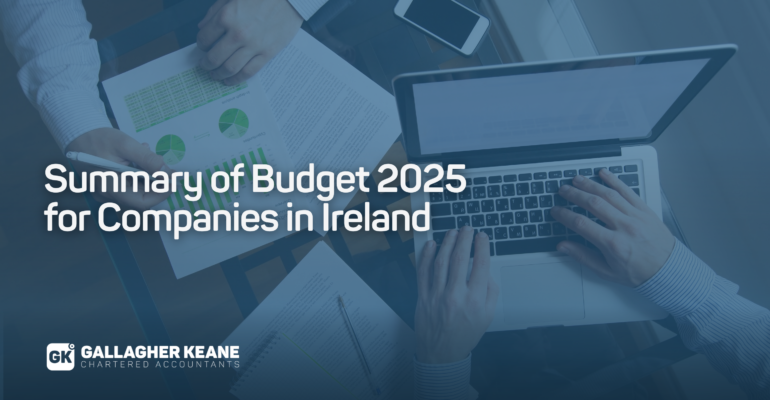Summary of Budget 2025 for Companies in Ireland

Summary of Budget 2025 for Companies in Ireland
Ireland’s Budget 2025 has introduced a range of changes, offering new tax incentives, support measures, and policies to help businesses grow. Whether you’re running a small enterprise or a large corporation, it’s important to understand how these changes will impact your operations. Here’s a quick refresh of the key updates, including changes to tax, rental tax credits, and other vital measures.
1. Corporate Tax Rate:
The corporate tax rate remains at 12.5%, but the focus has shifted to strengthening compliance. Businesses engaged in research and development will continue to benefit from the 25% R&D tax credit. There’s a refreshed focus on fairness and transparency in international tax, so companies with cross-border activities should stay alert to new regulations.
2. Capital Gains Tax (CGT):
Entrepreneurs looking to exit or transfer their business assets can benefit from an updated Entrepreneurs’ Relief. The reduced CGT rate of 10% applies to the first €1 million of gains, offering a refreshed opportunity for businesses planning to restructure or sell.
3. Employment Taxes:
Budget 2025 introduces a fresh reduction in the Universal Social Charge (USC) rates, benefiting both employees and employers. This reduction aims to improve workers’ take-home pay, which in turn helps businesses attract and retain talent in a competitive market.
4. Rental Tax Credits for Employees:
One of the standout changes in the budget is the introduction of rental tax credits for employees paying rent. This tax credit, worth up to €500 per employee annually, is a refreshing step towards addressing rising housing costs. Companies with employees renting properties may see this as a valuable support measure to make jobs more appealing in a challenging housing market.
5. Sustainability Incentives:
Ireland’s commitment to sustainability is reflected in Budget 2025, which includes increased green tax incentives for businesses investing in energy-efficient practices. This includes tax credits for electric vehicle fleets, renewable energy investments, and green building upgrades. Companies that focus on sustainability can refresh their operations with financial support while reducing their environmental impact.
6. Employment Support Scheme:
The Employment Support Scheme has been refreshed to provide greater flexibility for businesses facing economic difficulties. This scheme now offers more substantial subsidies to companies that retain staff during downturns, helping businesses safeguard jobs while navigating challenging financial periods.
7. Enhanced R&D Tax Credits:
For businesses focused on innovation, the government has introduced a refreshed R&D tax credit, offering greater financial relief for companies investing in research and technological advancement. This is a significant opportunity for businesses working on new products or processes to refresh their innovation strategies and reduce costs.
8. VAT Changes for Digital Services:
A key area of change is the VAT system, particularly regarding digital services. New regulations aim to refresh how VAT is collected from overseas providers of digital goods and services. If your business operates in e-commerce or offers digital services, staying updated on these changes is crucial to ensure compliance.
9. SME Support:
Budget 2025 includes refreshed financial support for small and medium-sized enterprises (SMEs), with additional funding for grants and loan schemes. These measures aim to boost innovation, help businesses access finance more easily, and support growth in a competitive market.
Reach out to us:
Reach out to us at Gallagher Keane for expert financial advice on how Budget 2025’s changes can benefit your business. With new tax credits, sustainability incentives, and enhanced employee support schemes, businesses must assess the impact of these updates. By taking advantage of these refreshed measures, companies can position themselves for success and drive new growth opportunities.


